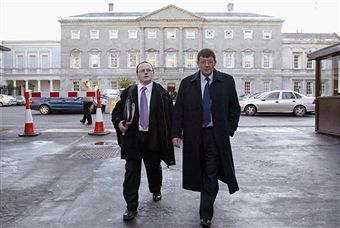 In continental lore, it is Britain that is often seen as the greatest impediment to EU
integration. The government’s EU Bill initially caused horror in the rest of Europe. Would Britain have to vote for each treaty change, even those needed to enlarge the Union? Before the text of
the bill became clear, every self-respecting eurocrat spat the name ‘Britain’ over their lait russe. Even now, they are not best pleased.
In continental lore, it is Britain that is often seen as the greatest impediment to EU
integration. The government’s EU Bill initially caused horror in the rest of Europe. Would Britain have to vote for each treaty change, even those needed to enlarge the Union? Before the text of
the bill became clear, every self-respecting eurocrat spat the name ‘Britain’ over their lait russe. Even now, they are not best pleased.
But in future it may not be Britain, but Ireland that will block any further EU integration. For Ireland is turning a lot more eurosceptic. The role of the euro in Ireland’s decline remains a subject of debate. In eurosceptic circles, there is wilful ignorance of the role played by Ireland’s politicians. Much better, it seems, to blame the euro alone.
Yet, the truth remains that the introduction of the euro – at a low interest rate hitherto unknown in Ireland – inflated an already unsustainable property boom. As Hugo Brady wrote in the Irish Times:
“Most Irish people feel that the rest of the eurozone and European Central Bank imposed a bail-out that their country did not need (Ireland could have limped on until mid-2011 despite its astronomical debts) at an interest rate that it could not afford (5.8 percent) in an ultimately futile attempt to contain a wider crisis.”
Starting a decade of EU-imposed austerity and without an option to default, Ireland’s voters are unsurprisingly – albeit a bit conveniently – growing more eurosceptic. Polls are moving in the same direction. Senior politicians from all parties are sounding increasingly eurosceptic, while a previous generation of pro-EU politicians, many of whom created Ireland’s mess, are retiring in shame.
The parallel with Britain is striking. It was the UK’s forced exit from the European Exchange Rate Mechanism in 1992, which really saw the eurosceptic movement take off. For Ireland, the bail-out/austerity programme may create the dynamic, perhaps even ultimately decimating the country’s pro-European movement.
As Ireland is constitutionally bound to hold a referendum on questions of European integration – and has done so on average every four or five years since 1987 – it look as if it’s increasingly eurosceptic voters will become a greater block on EU integration, perhaps even greater than the British.






Comments